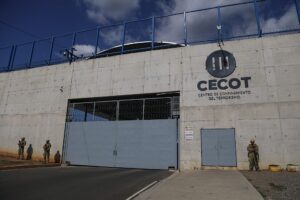A coalition of organizations filed damning new evidence today in a legal action seeking an emergency order from the Inter-American Commission on Human Rights, pending since May 9, and originally filed on behalf of all of the at least 288 migrants transferred from the United States to CECOT, a prison in El Salvador.
This included evidence from survivors of abuse at CECOT who have since been released, testimony of family members of Salvadoran detainees who were disappeared in March and an amicus curiae brief filed by current and former United Nations officials. The brief calls on the Commission to act and also notes El Salvador’s liability for human rights abuses the migrants suffered in the United States.
“We will not stand down until all individuals are safely released and back with their families,” said Silvia Serna Roman, an attorney at the Global Strategic Litigation Council.
The filing comes in response to a July 22 request from the government of El Salvador asking the IACHR to dismiss the case. In that request, El Salvador argued that because 252 Venezuelans were released from their custody on July 18, following a trilateral agreement between the governments of El Salvador, Venezuela and the United States of America, the Commission no longer has the power to issue an emergency order against El Salvador to protect the human rights of the estimated 36 proposed beneficiaries of the legal action who remain in custody.
“We ask the Commission to stand firm in their duty to protect those who remain silenced by their own government. The Commission has a duty to protect those with no other avenues for protection.” said Isabel Carlota Roby, a lawyer at RFK Human Rights.
“Urgent action is needed to find those still disappeared and to prevent this unlawful transfer practice from becoming a blueprint for future abuse,” said Felipe Navarro, Associate Director of Policy & Advocacy at the Center for Gender & Refugee Studies.
The evidence submitted from the survivors includes reports of beatings, verbal abuse and mistreatment amounting to torture or cruel, inhuman, or degrading treatment. The mothers of the two named Salvadoran detainees who disappeared in March have been unable to confirm their whereabouts and continue to seek justice.
“We have clear, new evidence of patterns of ongoing abuse,” said Ian Kysel, Associate Clinical Professor of Law at Cornell Law School and a co-founder of the Global Strategic Litigation Council. “The Commission must not turn away now.”
“Every day without action puts lives at greater risk, said Susan Akram, Director of the Boston University International Human Rights Clinic. “The Commission’s response is not just a matter of procedure — it could be lifesaving.”
In their pleadings submitted to the Commission today, filed under seal, the organizations urge the Commission to issue the emergency order requested in May. They ask the Commission not to close the case, noting that there are at least 36 Salvadoran individuals who are being held incommunicado and are at imminent risk of irreparable harm since they were transferred from the United States to El Salvador in March.
“When three UN Special Rapporteurs – including a former President of the Inter-American Commission – join a case, it’s because the stakes are high.” said Bella Mosselmans, Director of the Global Strategic Litigation Council. “El Salvador is not just detaining its own nationals unlawfully; it is helping cover up the United States’ violations. This is about justice for the 36 who remain disappeared, and about setting a precedent for regional accountability.”
Press Inquiries:
- Boston University School of Law Human Rights Clinic – Susan Akram, smakram@bu.edu.
- GSLC – Bella Mosselmans, bella.mosselmans@newschool.edu, +1-929-823-6381
- CGRS – Brianna Krong, krongbrianna@uclawsf.edu, +1-415-581-8835
- RFKHR – Isabel Carlota Roby, Roby@rfkhumanrights.org , +1-786-568-0146
About the Coalition
Robert F. Kennedy Human Rights advocates for human rights issues and pursues strategic litigation to hold governments accountable at home and around the world.
Boston University School of Law International Human Rights Clinic engages law students in the practice of international human rights law through direct representation, research, and advocacy. The Clinic partners with NGOs and communities around the world to advance global and regional human rights, including through international litigation.
The Global Strategic Litigation Council is a global coalition of over 600 NGOs, refugee leaders, lawyers, advocates, and academics working to advance the rights of displaced people through strategic litigation and coordinated legal advocacy.
The Center for Gender & Refugee Studies (CGRS) defends the human rights of courageous refugees seeking asylum in the United States. With strategic focus and unparalleled legal expertise, CGRS champions the most challenging cases, fights for due process, and promotes policies that deliver safety and justice for refugees.



